This Review Is the Scene of the Crime: Inception
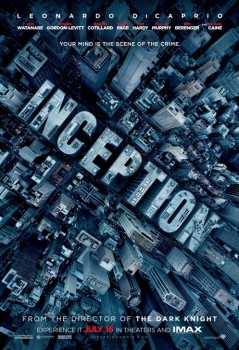 Inception (2010)
Inception (2010)
Written and Directed by Christopher Nolan. Starring Leonardo DiCaprio, Joseph Gordon-Levitt, Ellen Page, Tom Hardy, Marion Cotillard, Cillian Murphy, Ken Watanabe, Tom Berenger.
You expected a review of The Sorcerer’s Apprentice, didn’t you? I respect Dukas and Goethe too much for that. As apparently does the rest of the nation, since over the weekend the film made roughly the amount of change found in the lint catcher of the dryer.
Inception right now is the movie conversation. No matter what else occurs in cinema during 2010 (Tron Legacy! So hyped for that), this will known as the year of Inception. Even if We Make Contact. Inception is guaranteed to become a speculative-fiction classic that will sit on the same shelf with Metropolis, Blade Runner, 2001: A Space Odyssey, Alien, The Terminator, The Matrix, et al.
What? Did you think I was going to go against the grain of critical and viewer opinion that has almost cased and mounted Inception in the Hall of Fame?
I’m not. I can’t. The movie deserves every accolade it has received. I don’t even think there can possibly be a fan-backlash against it like there was with Avatar. Inception is as good as you’ve heard it is, and for many of you, it might even be far better.
But don’t walk into the theater with expectations, or even that much knowledge about it. Writer-director Christopher Nolan remained closed-mouth about the film in the build toward its premiere, which was the perfect approach. Inception isn’t exactly a “twist” movie (Bruce Willis was dead all along!), but it is a film of the constant escalation of surprise. Its story continues to plunge deeper and deeper, turning more complex with each passing scene, where the stories of most movie strip away complications as they head toward their finales. It’s a reversal that recalls Nolan’s second movie, the breakthrough Memento, but Inception is much more intricate in design. Hell, it makes Memento seem linear! Therefore, even though Inception can’t be spoiled with a single sentence the way you might spoil The Crying Game, it’s still best if you know as few details about the plot as possible or any of the specific scenes before you go in.
So why am I writing about it? I’ve just presented a good case for me not to write about it, and encouragement for you to stop reading what I’ve written about. I promise, I won’t reveal anything major except the barest outlines, but you should only move on with confidence if you’ve already seen Inception.
As for why I’m writing about it . . . I can’t help it because, over everything else that’s wonderful about Inception as a movie, it’s a piece of inspiration. This is the sort of film that makes you want to craft a piece of art that strives for the same level of excitement. Like the great movies and books and pieces of music, it leaves the perceiver with the sense of the power of imagination used to its fullest potential.
Here’s what I feel safe telling you, since this is what you can glean from trailers and promotional material:
Leonardo DiCaprio plays Dom Cobb, an expert “Extractor” who can use technology to enter people’s dreams and pilfer ideas that their subconscious attempts to lock away. It isn’t a one-man operation. The dream-space for the mark must first be constructed through an imaginative individual known as an “Architect,” and then through compounds created by a chemical specialist, the team enters the dream-space with the Mark. The Mark fills in the Architect’s constructs with his or her subconscious creations, and the team must avoid the subconscious’ projections that react against intrusion as they try to obtain the information they need. Essentially, Nolan’s script uses the structure of the heist/caper movie, but with the dream as the bank vault.
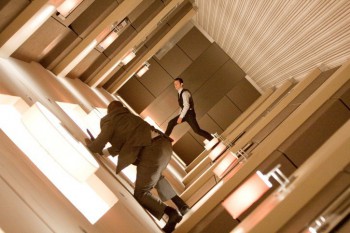 Following the classic heist-movie structure, the screenplay gives Cobb a chance to pull a “last big job” that will allow him to erase criminal charges against him that have prevented him from returning to the U.S. Industrialist Mr. Saito (Ken Watanabe) will pull the strings necessary to exonerate Cobb if he will do an unusual job for him, one that involves planting an idea in the head of the mark, industrialist Mr. Fisher (Cillian Murphy), instead of stealing one. Of course, nothing goes quite as planned once Cobb’s team enters the various dreaming layers created to pull off the operation, and Cobb’s own psychological problems are the biggest danger of all.
Following the classic heist-movie structure, the screenplay gives Cobb a chance to pull a “last big job” that will allow him to erase criminal charges against him that have prevented him from returning to the U.S. Industrialist Mr. Saito (Ken Watanabe) will pull the strings necessary to exonerate Cobb if he will do an unusual job for him, one that involves planting an idea in the head of the mark, industrialist Mr. Fisher (Cillian Murphy), instead of stealing one. Of course, nothing goes quite as planned once Cobb’s team enters the various dreaming layers created to pull off the operation, and Cobb’s own psychological problems are the biggest danger of all.
One aspect of Inception that is unusual considering the “dreamscape” premise is that Nolan, cinematographer Wally Pfister, designer Guy Hendrix Dyas, and effects supervisor Chris Corbould avoid extensive surrealism in the imaginings of the world of the dream. Compare this to Peter Jackson’s disappointing The Lovely Bones last year, which visualizes its dead-world as a pop ‘70s album cover in the vein of Bitches Brew, and Nolan’s dream-space is a world of steel-and-glass realism and restraint. The story provides a plot reason for this closer adherence to reality, which is well and good. But it works in the larger movie sense because the film can rely on the sudden intrusions of surrealism, which are brief and bizarre yet make complete thematic sense, to jolt viewers. The experiments with M. C. Escher-esque architecture occur at the exact right time to affect to the story and the senses, and then they get out—leaving viewers breathless and wanting more.
The place where Inception does fulfill the requirements of weird dreaming is in its hypnotic use of time and the overlay of action where seemingly unrelated locations have an impact on each other. Dream-time is unlike real time, as anyone who has ever fallen asleep can attest, and Inception captures that in an overlap of sequences that move at different speeds relative to each other. The movie then uses this overlap to create action scenes. The result is exhilarating; by the middle of the film, when I started to grasp how Nolan and his team where using this layering to create a tension framework, the intensity of the cinema experience had become equivalent to the world’s biggest caffeine rush. Special kudos here for the pounding and epic score from Hans Zimmer, which is woven deep into the film’s pacing and the interaction of parallel scenes.
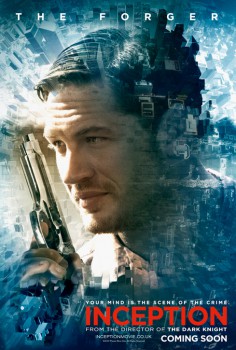 (Inception will come up for a pallet-load of Academy Awards, but the only award that I insist it win, because I simply cannot imagine that anyone will do a better job in this department the rest of the year, is for Best Editing. Lee Smith works a miracle of clarity and excitement from what must have been a monstrous load of footage occurring in layers time and space. This is a peak of the editorial art form.)
(Inception will come up for a pallet-load of Academy Awards, but the only award that I insist it win, because I simply cannot imagine that anyone will do a better job in this department the rest of the year, is for Best Editing. Lee Smith works a miracle of clarity and excitement from what must have been a monstrous load of footage occurring in layers time and space. This is a peak of the editorial art form.)
Inception also has a strong emotional core, but not one that requires the movie stop in its tracks to deal with it. The character drama is centered on Cobb, whose inner demons, in the shape of his dead wife Mal (Marion Cotillard), he must confront within the dream-heist in order for the team to survive. That’s all I can say about it without going too far into the script’s labyrinth of discovery, except to add that it works as a thematic binding for the other points of the film. There’s also a father-son conflict occurring with the Mark, Mr. Fisher, which I found bizarrely moving even though . . . okay, no more about that.
All the performances in Inception are first-rate, but there’s a trio that deserve special attention: Joseph Gordon-Levitt as Arthur the Point Man, Tom Hardy as Eames the Forger, and Ellen Page as Ariadne the Architect. These are the key figures on Cobb’s team of dream-invaders, and each actor fills out characters that in less capable hands would have seemed staid and under-realized.
Gordon-Levitt has arguably the toughest acting task in the film, since superficially Arthur the Point Man doesn’t have a character arc and we know little about him except that he’s exceptionally good at what he does. Yet the tics and mannerisms of Gordon-Levitt’s ultra-cool and smooth performance make Arthur one of the most memorable characters I’ve seen in a movie this year. His relationship with Cobb and especially Eames come across in the small ways that they bounce off each other, and Arthur flying into action when it’s his time to salvage the operation is intoxicating to watch.
Tom Hardy is brilliant actor who is coming into his own now; I recall how impressive he was as the villain Shinzon in the otherwise mediocre Star Trek Nemesis. He provides an amazing amount of fun as the witty chameleon figure, playing a flippant attitude and confidence that balances out the ice of Gordon-Levitt and the damage of DiCaprio. And he’s also our new Mad Max (the former Mad Max is currently plain old “mad” and not likely to do much of anything in the near future). Welcome to pop-culture stardom, Mr. Hardy. Can’t wait for Fury Road.
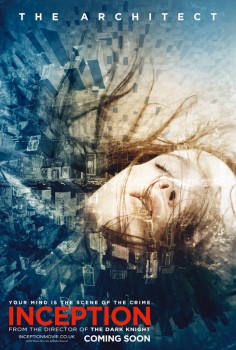 As for Ellen Page, she’s already an established success with major indie cred from Hard Candy and Juno. But this is the first time I’ve loved a performance from her, because it was the first time she didn’t seem to be performing. This is a mature, confident young actress, and I feel perfectly fine with her slow march toward conquering the world. The way she works with DiCaprio is magical, especially since this is a rare male-female central relationship in a movie that isn’t a romance. Cobb needs Ariadne’s presence to allow him space to explore his conflicts, and Ariadne’s fresh innocence and wonder contrasts in marvelous ways with Cobb’s cynicism.
As for Ellen Page, she’s already an established success with major indie cred from Hard Candy and Juno. But this is the first time I’ve loved a performance from her, because it was the first time she didn’t seem to be performing. This is a mature, confident young actress, and I feel perfectly fine with her slow march toward conquering the world. The way she works with DiCaprio is magical, especially since this is a rare male-female central relationship in a movie that isn’t a romance. Cobb needs Ariadne’s presence to allow him space to explore his conflicts, and Ariadne’s fresh innocence and wonder contrasts in marvelous ways with Cobb’s cynicism.
Christopher Nolan fills the movie with a myriad of influences that will no doubt form roundtable discussions for the next ten years. The Matrix will get name-checked above all else, but I’m already bored with that comparison, and the Wachowski Brothers’ 1999 hit didn’t weigh heavily on my mind while watching Inception the first time. Blade Runner and SF noir in general are much more at the front, as well Michael Mann crime thrillers (the general aesthetic is similar to Heat, which had a huge impact on The Dark Knight as well). The Fred Astaire musical Royal Wedding has a special part to play in what is the single most exciting section of the movie. And of course, Kubrick-Kubrick-Kubrick. Nolan’s chilly control, the technical mastery, and the use of architectural space are the most Kubrickian work I’ve seen since Kubrick ticked off the world by dying.
But the cinema comparison that struck me the most during my first viewing of Inception was . . . On Her Majesty’s Secret Service. Nolan is a hardcore Bond film-fan, and Inception’s straightforward international thriller aspect, with well-dressed and well-armed people shooting it up across the globe, owes a big metal suitcase worth of debt to the cinematic 007. (Nolan has said in interviews that he would like to direct a Bond film, but I can’t see the franchise letting this big of an auteur seize the reins. But wouldn’t Michael Caine make a great M? And Christian Bale should have been cast as Bond when Brosnan quit in the first place, but Batman grabbed him first.) But of all the Bond movies, its On Her Majesty’s Secret Service that stands front and center in Inception’s lexicon, with a lengthy set-piece that seems purposely designed to recall the 1969 film’s Piz Gloria finale. There’s also an emotional quality from this most sentimental and psychoanalytical James Bond film that seeps through Inception as it turns psychoanalysis of lost love into one helluva an action thriller.
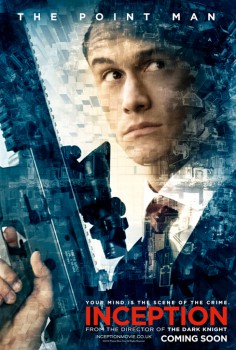 After seeing the movie, I finally allowed myself to indulge in other reviews of. (Previously, I had only glanced at snippets here and there, which were usually glowing with the same sort of phosphorous that I’ve just spilled over the screen.) The positive reviews made me recall the joy of watching the film, and created in me a shared love of moviemaking. But I noticed a pattern with the few negative reviews: these critics usually called Inception “incomprehensible” and “muddled” or words to the effect that the film makes no sense. For example, Rex Reed, who ceased having any importance to me as a critic when I found out that he remarked about The Outlaw Josey Wales that “never before has so much time been devoted to such trivia,” said in his specious “review” of Inception that “none of this prattling drivel adds up to one iota of cogent or convincing logic.” Of course I don’t care what Rex Reed thinks of Inception (or The Outlaw Josey Wales; seriously, Rex, what was the deal with that?) since, like the infamous Armond White, he’s just a troll at this point in his career. But this idea that Inception is bewildering and confusing seems to be the central tenant of the negative critics and the minority voices, and I have to address it because I believe it’s codswallop.
After seeing the movie, I finally allowed myself to indulge in other reviews of. (Previously, I had only glanced at snippets here and there, which were usually glowing with the same sort of phosphorous that I’ve just spilled over the screen.) The positive reviews made me recall the joy of watching the film, and created in me a shared love of moviemaking. But I noticed a pattern with the few negative reviews: these critics usually called Inception “incomprehensible” and “muddled” or words to the effect that the film makes no sense. For example, Rex Reed, who ceased having any importance to me as a critic when I found out that he remarked about The Outlaw Josey Wales that “never before has so much time been devoted to such trivia,” said in his specious “review” of Inception that “none of this prattling drivel adds up to one iota of cogent or convincing logic.” Of course I don’t care what Rex Reed thinks of Inception (or The Outlaw Josey Wales; seriously, Rex, what was the deal with that?) since, like the infamous Armond White, he’s just a troll at this point in his career. But this idea that Inception is bewildering and confusing seems to be the central tenant of the negative critics and the minority voices, and I have to address it because I believe it’s codswallop.
Inception is not a confusing movie. It’s layered. Many things happen. There are multiple motivations and a clever SF concept that requires a bit of thinking to grasp. There are numerous friendly debates about its overall meaning to fill up your next twenty coffee-shop stops. But all you have to do to follow it is to pay attention. Have we reached the point where even intelligent film critics (and Rex Reed) somehow think that they should turn their brains off in the movie theater, and that’s the test of whether it’s good or not? Have they really gotten that lazy? I never felt confused in a negative way during Inception. At times I wondered why things were happening, but in an engaged “I want to see where this is going” way. And Nolan and Co. don’t fail on the promise that as they pull us in the pieces will click together. More questions come up as others are answered, but the forward thrust of the movie is always easy to hold onto. At no point in the film did I think, “I have no idea what’s happening.” The movie has it’s own logic, and does a remarkable job of getting it across to viewers who want to engage the film, the same way they engage in reading a great book. Inception is active filmmaking; if you participate, the rewards are endless. I immediately wanted to see it again, not because I felt I didn’t understand something, but because I wanted to encounter the work on a new level: the level of one who played the game, loved it, and wants to play again to watch all the pieces move.
I think that Nolan’s script and his performers do an incredible job with the exposition of how extraction and the dream-space operate. Explaining it does require a lot of work, but the script makes it feel effortless. Nobody simply sits down and talks about it, or pulls out some dull power-point presentation. The information flows when it needs to, arrives at the right time, and hits with the precision of virtuoso jazz drummer. The character of Ariadne is the most important in making the logic of the Nolan’s word of dream-architects and invaders speak to viewers, since she is the viewer. This is one of the best uses in film I’ve seen of the outsider used to introduce the viewer to intricate subjects.
Will a better film than Inception come along this year? I encourage everybody to try to top it. Filmmakers, you should all be trying this hard. You should all dream this big.
Great review, Ryan! INCEPTION is the kind of movie that motion pictures were invented for. As for those who call it “confusing” that is only to be expected…this is a movie that DEMANDS intelligence from its viewers. There will be a certain percentage of every audience who sees INCEPTION that will not be able to follow it’s intricate logic and plot twists. The film moves fast, delivers information even faster, and uses that information to ramp the action to an even faster pace, one thing building on another at breakneck speed, and Nolan doesn’t give the viewer a lot of time to sit and process the logic of his movie universe. This is utterly captivating to those viewers who are cognitively able to keep up with it; yet it will be frustrating to those who simply can’t wrap their minds around it. And they are out there…some of them are highly paid critics…they are the same critics who say preposterously great things about terrible movies.
INCEPTION, like many great works of art, requires a certain level of intellectual ability to fully appreciate. For those who don’t want to THINK when they watch movies, they’re just not going to get the same experience.
Personally, I’m extremely grateful to Nolan for delivering such a challenging and brilliant film in a summer otherwise full of brain-dead, knuckle-dragging, cinematic dreck.
INCEPTION is a thinking man’s movie. (Or thinking woman, as the case may be.)
Thank you, Christopher Nolan.
BRAVO!!!
wow i was not going to see this movie until i read this. great review ryan
i went and saw it last night. I liked it a lot. The cast worked really well together. However i don’t think its a movie i could watch more than once or twice…a lot of movies are like that with me.
One thing i kept thinking about during the movie was the Howard Kull short stories that i have read recently, expecially ‘The Mirrors of Tuzun Thune’. with all of this i am dreaming or in reality stuff.
[…] much beyond saying, “That ‘Apes reboot thingy’ was a sort of cool flick. Hey, let’s watch Inception […]